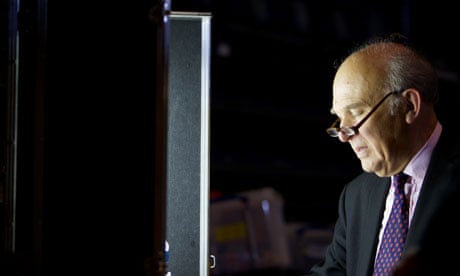8.33am: We haven't really had any striking speeches at this conference so far, by which I mean speeches so bold that people will remember them in the years to come. But Vince Cable, the business secretary, is going to deliver one today. The Lib Dems released embargoed extracts yesterday afternoon and within an hour or so an aide to George Osborne, the chancellor, was on the phone to Liverpool wanting to know if it was really true that Cable was declaring war on capitalism. Cable has been seeking to clarify his remarks this morning. He told the Today programme that he was "pro-business" and "pro-market". But Digby Jones, the former CBI director general, accused him of behaving like a "rabble-rouser" and urged him to rewrite his speech before he delivers it. (I'll post more details about their comments soon.)
The Cable speech looks set to be the highlight of the day. But there are plenty of other things going on before the Lib Dems head home this afternoon. Here's a full agenda.
9am: Debate on Trident.
9.45am: Debate on diversity, and proposed changes to selection rules to ensure more ethnic minority candidates are selected.
11.15am: Speech from Lynne Featherstone, the equalities minister.
11.35am: Q&A on criminal justice.
12.20pm: Speech from Vince Cable.
2.30pm: Speech from Don Foster, co-chair of Lib Dem parliamentary culture committee.
2.50pm: Q&A with Lib Dem cabinet ministers.
3.35pm: Lady Scott, party president, closes conference.
I'll be covering all the conference developments, as well as taking a look at the papers and bringing you all the best Lib Dem news and comment from the web.
And I'll also be posting my "10 things I've learnt from the Lib Dem conference" later today.
8.56am: For the record, here is what Cable says about capitalism in the extracts from his speech released yesterday under embargo.

The principle of responsible ownership should apply across the business world. Let me be quite clear. The government's agenda, is not one of laissez-faire. Markets are often irrational or rigged. So I am shining a harsh light into the murky world of corporate behaviour.
Why should good companies be destroyed by short term investors looking for a speculative killing, while their accomplices in the City make fat fees? Why do directors forget their wider duties when a fat cheque is waved before them? Capitalism takes no prisoners and kills competition where it can.
8.57am: On the Today programme this morning Vince Cable insisted that his speech did not mean that he was anti-business.
It will be a pro-market, pro-competition speech. Capitalism, if it's going to work properly, has got to be competitive ... This recovery is going to happen through private enterprise. In particular, it's going to happen through very large numbers of small companies expanding.
Last night, responding to the extracts of the speech released to the media, Richard Lambert, the current director general of the CBI, said : "It's odd that he thinks it sensible to use such emotional language."
This morning Cable said that he had since spoken to Lambert and that he hoped he had reassured the CBI boss.
"He hasn't seen the full text of what I'm going to say he only saw a couple of sentences out of context," Cable said.
"He knows where I am that I'm totally committed to getting a private sector recovery, which is of course what he and his members want."
On Sky later Cable explained why he was expressing himself so forcefully. "The language is direct and colourful," he said. "I don't speak in bureaucratic language."

9.17am: And here's what Digby Jones, the former CBI director general, said about Cable's comments on the Today programme this morning.

There's a massive difference between saying we need not more, but better, and better enforced regulation - in which I think he's right - and what he's intending to say, that there are these dark areas of the boardroom, that business is 'at it' basically. Of course you get businesses that are not stepping up to the plate of good quality corporate governance. By the way, you get journalists who don't do that. You get trade unionists who don't do that. May I say, Mr Cable, you get politicians who don't do that. We are just a reflection of society.
What I don't want him to do is create the impression in schools, in colleges and in all parts of society that business is somehow this whipping boy that is always 'at it'. Becaue, if we do, we will find that we create an environment where people don't want to invest here, they don't want to employ people here, they don't want to work here, and then of course we won't trade our way out of the mess.
He is the business secretary. If he wants to be a Liberal MP, go to a conference and have the whinge that they've had every year, fine. Welcome to a free world. [But] you can't step up to the plate as secretary of state for business and then behave still as a Liberal campaigner, which he always has been.
Jones also accused Cable of behaving like "a Liberal rabble rouser". And he urged Cable to re-write his speech. "There's still time, Vince. You can still withdraw it," Jones said.
9.29am: A colleague suggests I should take a look at Paul Burstow's website. Burstow, you will remember, is the Lib Dem health minister who told the conference yesterday: "I would encourage people to ... stop reading the Guardian, because the Guardian is a spreader of misinformation and lies."
And what do I find? On the biography page, he's posted this:
The Guardian described Mr Burstow as: "One of the most knowledgeable and effective politicians on older people's issues, the Lib Dem spokesman at times seems the only parliamentarian taking a real interest in elderly care, and has almost single handedly kept older people's issues on the political agenda. He constantly wrongfoots ministers and has played a key role in exposing scandals of over-medication and elder abuse."
10.21am: Sorry for the lack of updates. There have been a few technical problems, but they seem to have sorted themselves out now.
10.22am: The Lib Dems have just passed a motion saying that the exclusion of Trident from the strategic defence review is "untenable" and that the Lib Dems should press for that review to consider an alternative to a "like-for-like" replacement to Trident.
This is theoretically difficult for the coalition, because the Tories are strongly committed to Trident. But this is one of the few issues where the coalition agreement includes an "agreement to differ". It says: "Liberal Democrats will continue to make the case for alternatives."
In the debate Tessa Munt, a Lib Dem whip, said she felt so strongly about this issue that she was prepared to resign over it, although she did not make it entirely clear what would have to happen for her to leave the government.
Shirley Williams (Lady Williams), the former Labour cabinet minister who helped to found the SDP, backed the motion (as did everyone who spoke in the debate). She said that Trident was a Cold War weapon and that replacing it with a like-for-like system would undermine President Obama's attempts at arms control.
Nick Harvey, the Lib Dem defence minister, said the motion was restating party policy.
But we are, of course, conference in a coalition. And in a coalition we get some of what we want and they get some of what they want.
Harvey said that that although the Tories had not agreed to reconsider the principle of Trident, they had had accepted in the coalition agreement that there should be a value-for-money study of the Trident replacement programme. He said he was "optimisitic" that that study, which will feed into the strategic defence review, would find some ways of reducing the cost of Trident replacement.

10.28am: The Lib Dems will try to stop the Tories taking the decision to press ahead with Trident replacement before the 2015 election, Nick Harvey told the conference during the Trident debate.
Nick Harvey was speaking about the timing of Trident replacement in the debate. He said the key moment was the "main gate" one. That's when the contracts are signed, the metal starts being bashed and the money starts to flow, he said. It was "the point of no return".
At the moment the "main gate" is scheduled for the end of 2014 or the start of 2015. If it were to be delayed for a few months, until after a May 2015 election, that would be "of no great financial significance". But it would be of huge political significance.
The Conservatives know that they are not going to be able to look to the Liberal Democrats to help them get that through parliament. So the issue will be a hot potato for Labour. On the eve of the next general election, determined to portray the Liberal Democrats as crypto-Tories who propped them up for five years, Labour will have the headache of deciding whether they are going to ride to the rescue of the Conservative party on Trident. The Liberal Democrats are not going to change our mind. As for Labour, watch this space.
10.28am: Amazing. A deaf Lib Dem delegate has just told the conference that, under an ancient electoral law still on the statute book, a candidate can be barred from parliament for being deaf and dumb.
David Buxton, a councillor, was speaking using sign language, with an interpreter helping him out. He said that when he stood for a parliament, a Labour rival threatened to use that law against him if he won.
Buxton was speaking in the debate on diversity. The main motion says the party should ensure that at least one ethnic minority candidate is on the shortlist when the party selects candidates in winnable seats. (The Lib Dems have not got any ethnic minority MPs.) But there is an amendment down that would replace this with a much weaker reference to "targets" and it is clear that there is a lot of opposition to the main motion, which one delegate has described as "discrimination".
10.41am: George Osborne has effectively "put Trident into the defence review" by declaring that the costs of Trident replacement have to come out of the Ministry of Defence budget, Sir Menzies Campbell has told the BBC.
10.49am: Pat McFadden, Labour's business spokesman, has issued a statement about Vince Cable's speech.
Vince Cable knows how to get a cheer from the hall. But his attempt at being in opposition and in government at the same time can't go on forever. As he bashes banks and capitalism, the real test will be whether growth returns and business gets the support it needs from the finance sector. On that, he'll need more than warm words.
11.04am: Simon Hughes, the Lib Dem deputy leader, has just spoken in the diversity debate. It was a very short speech, but in many ways it was a much better speech than the one he gave yesterday, because he was trying to influence the way delegates will vote. He said he was strongly in favour of the original motion and that it was "just unacceptable" for the party to have no ethnic minority MPs. Addressing those delegates who are opposed to positive discrimination, he said: "I understand your purist liberal principles, but you are wrong about this."
11.15am: Charles Angin, a delegate from Vauxhall, came out with a particularly poweful line in the debate.
When you are being beaten by the Conservative party on the issue of ethnic diversity, you know that something has gone very, very seriously wrong.
11.45am: The Lib Dems have just voted to water down the diversity amendment. They have thrown out the proposal for at least one ethnic minority candidate to be included on the shortlist in winnable seats and at byelections. That's a blow to Nick Clegg and Simon Hughes, who both said they were strongly in favour of change. The weakened motion, which calls for the party to set targets for the number of ethnic minority candidates chosen and to "dramatically increase" the number of ethnic minority people on the list of approved candidates, has been passed.
12.07pm: Vince Cable has received some backing from the TUC. Brendan Barber, the TUC's general secretary, has put out this statement.
Vince Cable is reflecting the widespread concern that not enough has been done to wean the City off its addiction to the high-risk, high-bonus practices that caused the great crash of 2008. He is right to say we need a new approach and the consultation is welcome. But the policies will need to be as bold as the rhetoric if we are really going to place the UK economy on a new footing.
12.32pm: Vince Cable is just starting his speech now. But I've been able to read the full text and the embargo has been lifted. Here are the main points.
At least 10% of shares in Royal Mail will be allocated to the workers when it is privatised, Cable has announced. In his speech he says that Royal Mail employees will benefit from "the largest employee share scheme of any privatisation for 25 years." The business department have said this means at least 10% of shares going to employees. Futher details will be in the Postal Services Bill being published in the autumn. Cable also confirms that the Post Office network is not for sale.
Cable rules out a merger with the Tories. "We had to go through a merger to found our parties … we will never merge again," he says.
He also rules out an electoral pact in 2015. "We will fight the next general election as an independent force with our options open," he says.
He accuses bankers of doing more damage to the economy than militant trade unionists.
On banks, I make no apology for attacking spivs and gamblers who did more harm to the British economy than Bob Crow could achieve in his wildest Trotskyite fantasies, while paying themselves outrageous bonuses underwritten by the taxpayer. There is much public anger about banks and it is well deserved.
He insists that he is inspired by Adam Smith, not Karl Marx. The speech includes the passage about capitalism "taking no prisoners" that the Lib Dems released last night. (See 8.56am) This provoked suggestions that Cable was turning Marxist. But, in his speech today, the sentence ends with a clause not in the text issued last night: "Capitalism takes no prisoners and kills competition where it can, as Adam Smith explained over 200 years ago."
He accuses Labour of adopting an "infantile" approach to tackling the deficit.
We are faced with an aggressive Labour opposition which has chosen the easy option of deficit denial. Deficit; what deficit? Nothing to do with us, guv … They built a house on sand and thought that they were ushering in a new, progressive work of architecture. It has collapsed. They lacked foresight; now they even lack hindsight. A proper debate is impossible with people who start from the infantile proposition that there isn't a problem; and simply hark back to a failed world of 'business as usual'.
Cable also makes a virtue of his radicalism. The speech starts with a passage bound to go down well with delegates.
I have managed to infuriate the bank bosses; acquire a fatwa from the revolutionary guards of the trades union movement; frighten the Daily Telegraph with a progressive graduate payment; and upset very rich people who are trying to dodge British taxes. I must be doing something right.
12.58pm: Vince Cable received a rousing reception at the Lib Dem conference. But my colleague Simon Goodley has been assessing the reaction in the City, on the trading floor of financial spread betting firm, City Index. Simon sent me this:

Cable is not exactly a hero here. Neil Looker, chief foreign exchange dealer, at City Index says: "He's still got the hump – he thought he'd get the Chancellor job. He's the business secretary. We're fully aware of his opinions. He doesn't like bankers. Next!" Giles Watts, head of equities, adds: "He's playing to his own audience. We knew what he was going to say so the market is taking it in its stride."

1.35pm: Here's a lunchtime summary:
Vince Cable has cheered Lib Dems with a combative speech attacking "spivs and gamblers" in the banking industry and complaining about the "murky world of corporate behaviour". The business secretary also said that, if he had upset the trade unions and the Daily Telegraph, he "must be doing something right". He did not withdraw any of the comments about the problems with capitalism which led to him being criticised by the CBI after they were released last night, but he did insist that he had a "pro-market, pro-business agenda". Nick Clegg has defended the speech. "You don't control every noun, adjective and adverb of everybody's speech. Vince is an extraordinarily authoritative, popular and insightful politician. The point he was making was a very good one," Clegg said.
Cable has said that at least 10% of the shares in Royal Mail would be made available to employees when the company is privatised. He said this was the largest employee share scheme for any privatisation since 1984. But the CWU, the postal workers union, dismissed the offer. "Any offer of shares to employees is deeply patronising for people who have invested their working lives to a public service," said Billy Hayes, the CWU general secretary.
A Lib Dem minister has said his party will try to stop the final decision being taken about replacing Trident until after the 2015. Nick Harvey told the conference that this strategy could create a "headache" for Labour because they would have to decide whether or not to help the Conservatives. He made his comments in a debate which saw the Lib Dems call for Trident to be included in the strategic defence review. (See 10.28am)
The Lib Dems have voted against plans to use a form of positive discrimination to enable the party to get more minority ethnic candidates into parliament. The proposal was voted down in favour of an alternative scheme relying on targets. This represents a defeat for Clegg, who said earlier this week that the party was "in the last chance saloon" on diversity. (See 11.45am.)

2.04pm: Bob Ainsworth, the shadow defence secretary, has put out a statement criticising Nick Harvey's comment on Trident. (See 10.28am)
This is a completely immature way to decide our future defence and security policy. The government must make those decisions in the best interests of our country, not delay them just to score political points. Putting off difficult decisions shows just how weak this coalition is. The Liberal Democrats need to grow up and start acting like a responsible governing party.
2.43pm: After five days in Liverpool, what have we found out? Here's my "10 things I've learned from the Lib Dem conference".
1. The Lib Dems have made up their minds about the coalition – and they like it. Journalists came to Liverpool expecting to find evidence of a grassroots backlash against Nick Clegg's decision to go into coalition with the Tories. Well, forget it. There have been grumbles, but (this week) they have been inconsequential. In so far as you can say what the party as a whole thinks, it's broadly happy with the coalition, and expects it to last.
2. Nick Clegg doesn't need to worry about the Lib Dems' three ex-leaders. Lord Ashdown, Charles Kennedy and Sir Menzies Campbell have at times been depicted as coalition-sceptics with the potential to move against Clegg at some point in the future if things turn sour. But the conference has shown that Kennedy is not really a frontline figure in Lib Dem politics at the moment, Campbell has kept a relatively low profile and Ashdown has come out as one of Clegg's biggest fans, describing him as someone who is "going to be a very great leader of our party."
3. The Lib Dems are not turning into a rightwing party. Sometimes Lib Dem ministers and Tory ministers can sound quite similar. At a fringe meeting last night, I heard the Tory Oliver Letwin say that he enjoyed working with Danny Alexander and that he had "yet to find any major difference between us". But you don't have to spend long listening to the debates here to realise that Lib Dem activists are quite unlike their Conservative counterparts. The Lib Dems are defnitely more "leftish" and at a Tory conference you are unlikely to hear a self-proclaimed atheist transexual speaking up for gay marriage in a long debate on equality.
4. The Lib Dems understand coalition politics better than the media. Westminster journalists like me are often asking the Lib Dems how they will fight an election against the Tories after five years of coalition. Lib Dems are genuinely bemused by this. They point out that this is not a problem in Scotland, Wales, local government or continental Europe – all places where three-party politics is more entrenched than Westminster. At a fringe meeting last night, Ashdown asked delegates to put their hands up if they had shared power with another party. Dozens of them responded. Then he asked if anyone in that group had had a problem fighting an election against their coalition partners. No one thought it was an issue.
5. The Lib Dems and the Conservatives are both committed to localism – but very different kinds of localism. The Lib Dems like councils. They even passed a motion saying that eventually councils should be allowed to raise 75% of their revenue locally. The Tories also like decentralisation, but they are more wary of empowering local authorities. At some point this might cause problems for the coaliton.
6. The Lib Dems are beginning to believe they could benefit electorally from being in coalition with the Conservatives. Conventional wisdom says smaller parties always get eaten up in a coalition. In May, many Lib Dems seemed to believe this. But they have noticed that voters seem to like parties cooperating and Chris Huhne told the conference this week that they should make a virtue of the fact that they're a collaborative bunch.
7. The alternative vote campaign seems to be in trouble. The polls show support for AV is falling and it is hard to find a Lib Dem confident that AV will get through. Clegg launched the Yes campaign at a rally on Saturday. But some Lib Dems think voters will use the referendum as an excuse to punish the coalition for the cuts and, if the Yes campaigners have got a strategy to deal with this, they haven't bothered to tell anyone what it is yet.
8. Lib Dem relations with the media are getting tetchy. There has been a surprising amount of sniping at the media from the platform this week. Maybe it's just because the Lib Dems are in government. But my cod-psychology theory is that the repressed anger generated by years of being patronised and ignored by the papers is finally erupting.
9. Lib Dem delegates don't necessarily decide policy any more. The Lib Dems are more democratic than the other parties. For years, conference really has decided policy. But this week delegates have been passing motions which, although technically party policy, will not decide what the government does. Whether or not a conference motion influences the coalition will depend on whether or not Clegg fights for it at the cabinet table.
10. Miriam González Durántez is going to be an interesting figure in our national life. Clegg's wife received plaudits during the election campaign for getting on with her job and refusing to play the conventional role played by the leader's spouse. This week she had a ding-dong with Channel 4's Jon Snow and gave short shrift to an interviewer from the Times. It won't be dull while she's around.
This is a subjective list. Please feel free to suggest your own ideas in the comments.
I'll be posting again before the conference winds up.
3.18pm: In his speech Vince Cable said that when he criticised capitalism, he was just reflecting the views of Adam Smith. But Eamonn Butler, director of the Adam Smith Institute, has said that that Cable has misunderstood the great economist.
Vince Cable is wrong on capitalism and wrong on Adam Smith ... It is not capitalism that kills competition. It is regulation, and regulated capitalism ... Smith famously wrote that when people of the same trade meet together, the talk soon turns into 'a conspiracy against the public'. But it seems that many people, including Vince Cable, have not read the following paragraphs, which explain that it is regulation that brings on these cartel meetings and makes the conspiracy stick.

3.23pm: My colleague Nicholas Watt has written a blog with his verdict on Vince Cable's speech.
The sight of screaming business leaders may do the Lib Dems no harm. Nick Clegg has faced criticism for failing to differentiate the Lib Dems from the Tories. David Cameron is unlikely to be accused of adding Karl Marx to his holiday reading list.
3.26pm: Sir Menzies Campbell, the former Lib Dem leader and a former Olympic athlete, has been appointed to the Olympic Board, the Lib Dem conference was told today. Don Foster, co-chair of the Lib Dem parliamentary culture committee, made the announcement in a speech. Campbell held the British 100m record from 1967 to 1974.
3.37pm: The RMT's general secretary, Bob Crow, has responded to being called a "Trotskyite" by Vince Cable. (See 12.32pm)
I'm not surprised that Vince Cable has chosen to attack me and the trade union movement because he knows that we will be the main point of resistance to his government's savage assault on jobs, living standards and public services. He may have raised a few laughs in the conference hall but the people at the sharp end of the ConDem's cuts attack haven't got much to smile about and nor will Vince Cable when his party gets a hammering in the polling booths.
3.38pm: Simon Wolley has written a good piece for Comment is free about Nick Clegg's failure to win the vote on diversity.
I'm depressed. There's no other term for it. I've just sat through two hours of the Liberal Democrats' diversity debate that sought to address the fact that they, as elected politicians at Westminister, the Greater London authority, the Welsh assembly, the Scottish parliament and the European parliament, are all white, with very few women, and none have disabilities. And yet they voted to do nothing. They decided to throw out every practical measure aimed at addressing the structural inequality that has persisted for the last 50 years.
3.45pm: The Q&A with Lib Dem cabinet ministers has just finished. Mostly it was quite routine, but there was an interesting answer at the end when the panel were asked about the most surprising things they had learned since being in government. Danny Alexander, the chief secretary to the Treasury, said "Eric Pickles". Pickles was someone that he did not know very wel, Alexander said, and someone about whom he had preconceptions.
He turned out to be the most formidable cabinet ally in driving forward localism and decentralisation within government, something that we have believed in for a long time.
3.55pm: That's it. Lady Scott, the outgoing party president, wound up the conference with a graceful speech in which she said she was "so proud" of what the Lib Dems had achieved. There was no triumphalism; just a quiet tone of self-congratulation.
I've posted my verdict (see 2.43pm). I'm heading home. I'll be blogging again on Saturday, when the Labour party gathers in Manchester to hear the results of the leadership contest.
Thanks for the comments.

Comments (…)
Sign in or create your Guardian account to join the discussion